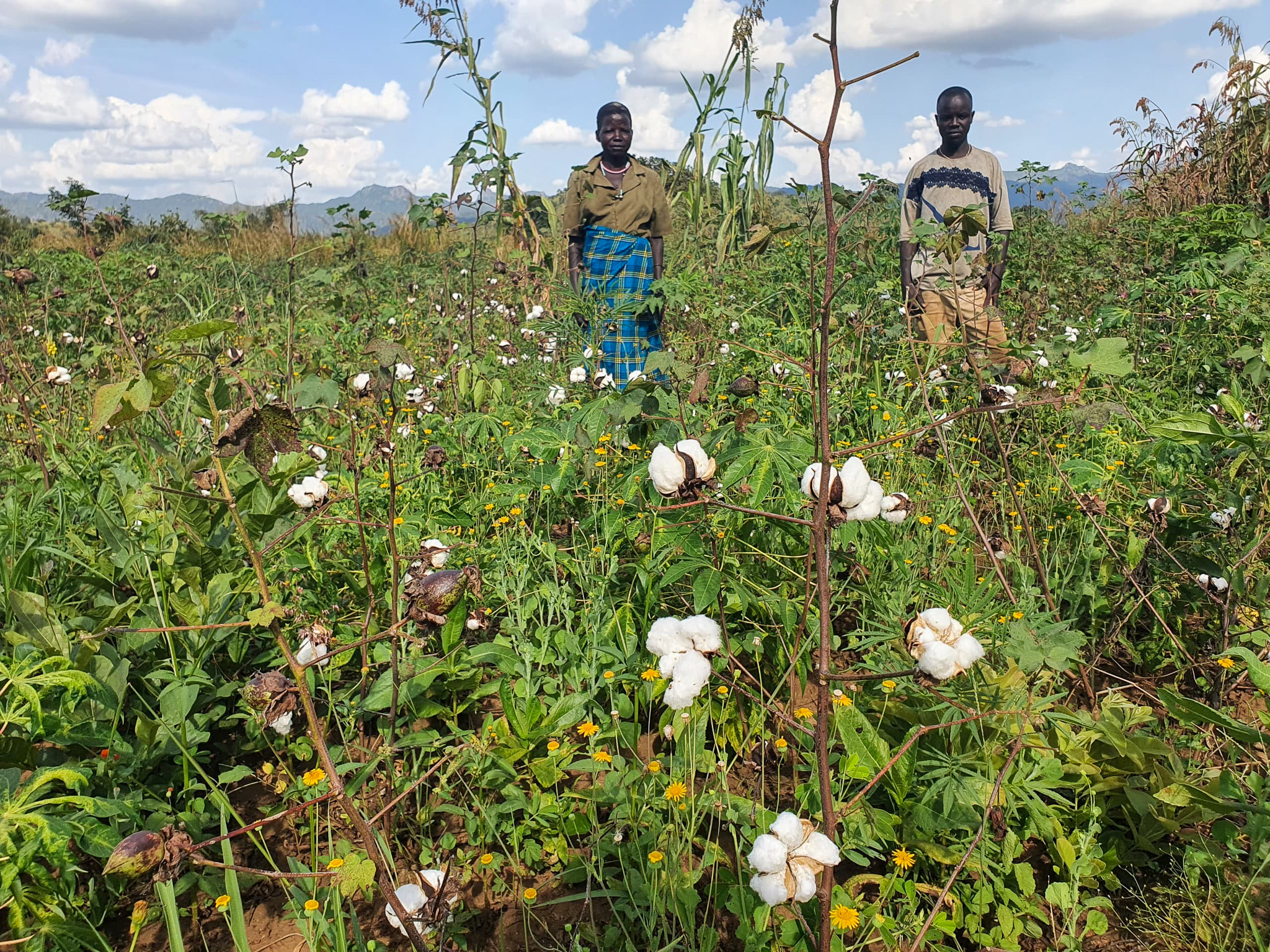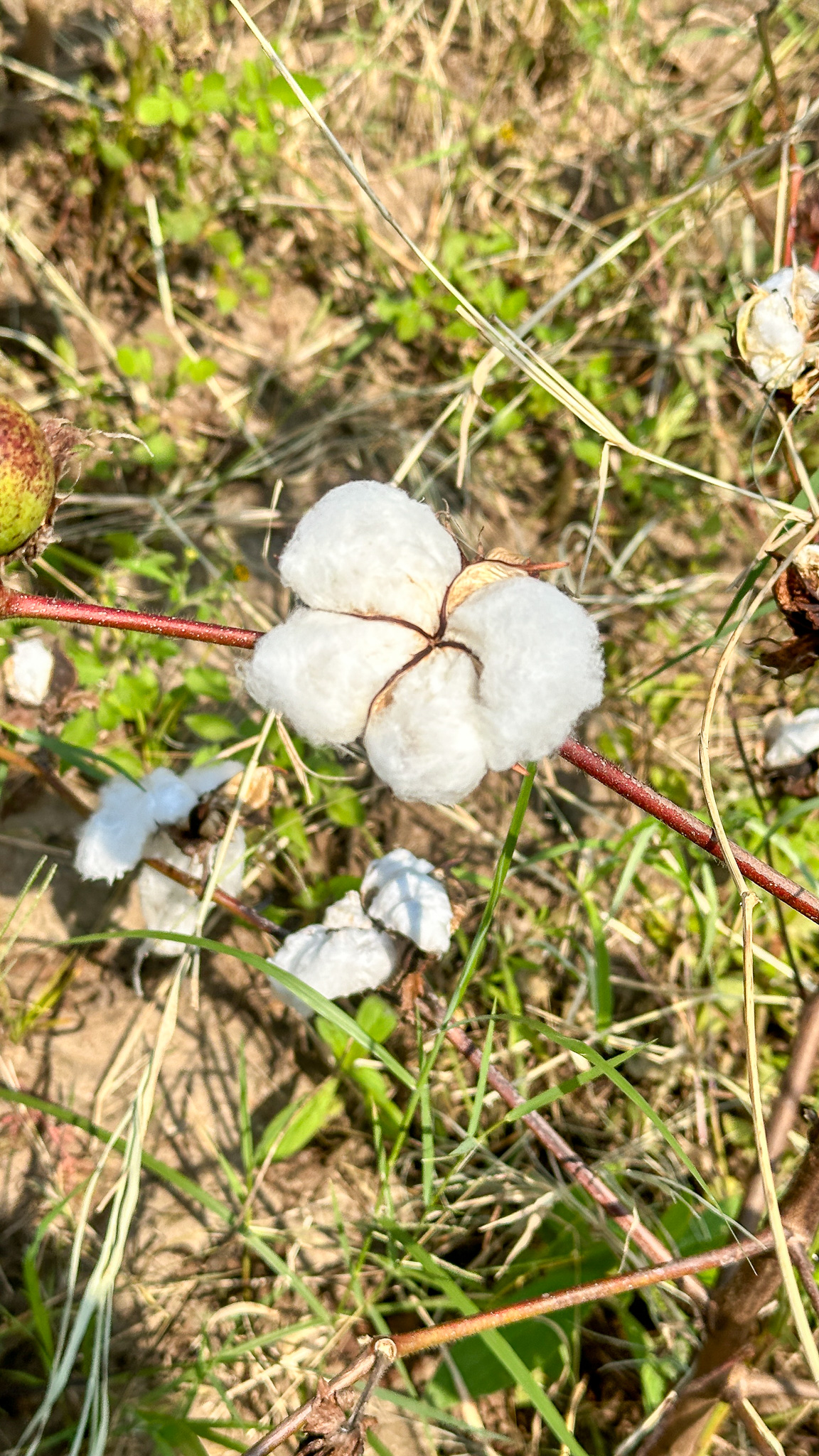AWF, Conservation International & DADO Launch Regenerative Cotton Project in Uganda’s Kidepo Landscape

Farmers posing in the cotton fields
General Inquiries
Tel:+254 711 063 000
Ngong Road, Karen, P.O. Box 310
00502 Nairobi, Kenya
The African Wildlife Foundation (AWF), in collaboration with the Dynamic Agro-Pastoralist Development Organization (DADO), launched a three-year regenerative cotton project in northern Uganda’s Kidepo Landscape.
This initiative, funded by Conservation International’s Regenerative Fund for Nature, aims to create a sustainable cotton value chain that prioritizes biodiversity and supports smallholder farmers, particularly vulnerable, marginalized Indigenous women and youth.
This project will collaborate with key stakeholders, including local farmer cooperatives, government officials, the Uganda Cotton Development Agency, and the Uganda Wildlife Authority. It will engage over 2,000 existing cotton farmers, 50% of whom are women, across the Karenga and Kitgum districts.
In total, it is expected to impact about 12,000 household members positively, enhance regenerative cotton production in up to 6,000 hectares (ha), and restore up to approximately 32,000 ha of land surrounding the cotton fields.

Photo of the cotton crop in the field
Cotton is one of Uganda’s principal export crops, primarily grown by smallholder farmers, who typically cultivate on a hectare or less. While its production increased by 36% in Uganda’s 2021/22 financial year, reaching 12,783 metric tons, it still fell short of the expected 20,000 metric tons (Cotton Development Organization, 2022). Contributing factors include climate variability, shrinking farm sizes, and inadequate access to sound agronomic practices. This new project will address these challenges by promoting regenerative agriculture, including organic farming methods and improved soil management.
“Regenerative agriculture is the future—not just for farmers, but for the landscapes and communities that depend on them. Through this partnership, we are investing in a cotton value chain that strengthens both livelihoods and ecosystem health. By integrating sustainable farming practices and restoring degraded lands, this initiative demonstrates how agriculture and conservation can work hand in hand to create lasting impact in Uganda,” said Jim Fitzpatrick, Director of Conservation International’s Regenerative Fund for Nature
The Kidepo Landscape is a key transboundary biodiversity hotspot, home to iconic wildlife such as elephants, lions, buffaloes, cheetahs, and giraffes, as well as numerous bird species. However, the expansion of agricultural production, driven by population pressure and the growing demand for arable land, is leading to the loss of critical wildlife corridors and dispersal areas.
As a result, traditional animal migratory routes are being disrupted and now intersect with cotton fields. This shift has led to increased human-wildlife conflicts, particularly as elephants damage cotton plantations.
“This transformative project will promote sustainable farming practices that enhance cotton productivity and production in degraded areas that are less critical for wildlife; while delivering high-quality cotton to international markets.” said Timothy Okudu, AWF Project Officer for the Kidepo Landscape. “Ultimately, these efforts aim to mitigate human-wildlife conflict, boost household incomes and reduce pressure on wildlife corridors and dispersal areas.” He added.
Simon Lomoe, DADO’s Executive Director, further stated that the project will empower local farmers by providing essential tools and knowledge in agronomic best practices, organic and climate-smart production, post-harvest handling techniques, and strategies for managing human-wildlife conflict.
"The Karenga and Kitgum Districts are excited about this initiative’s potential to boost cotton yields and improve livelihoods,” said Ssegawa Jimmy Ebil, Resident District Commissioner of Kitgum District. “We also look forward to strengthening market linkages to enhance sales, ensure quality, and refine production protocols.”
This project envisions a future where cotton production in the Kidepo landscape improves livelihoods, alleviates pressure on natural resources, minimizes habitat loss, and safeguards Kidepo’s invaluable biodiversity by linking conservation with sustainable agriculture.
About African Wildlife Foundation
The African Wildlife Foundation is the primary advocate for protecting wildlife and their habitats as an essential part of a modern and prosperous Africa. Founded in 1961 during the African independence movement to build our capacity to steward our natural resources, AWF articulates a uniquely African vision. It bridges science, education, public policy, and field programs to demonstrate the benefits of conservation and build a future for Africa where people and wildlife thrive.
About Conservation International
Conservation International protects nature for the benefit of humanity. Through science, policy, fieldwork, and finance, we spotlight and secure the most important places in nature for the climate, for biodiversity, and for people. With offices in 30 countries and projects in more than 100 countries, Conservation International partners with governments, companies, civil society, Indigenous peoples, and local communities to help people and nature thrive together. Go to Conservation.org for more information, and follow our work on Conservation News, Facebook, Twitter, TikTok, Instagram, and YouTube.
About Regenerative Fund for Nature
The Regenerative Fund for Nature was established in 2021 by Conservation International and the global Luxury group Kering — with Inditex joining in 2023. Its mission is to support innovative agricultural practices and transform the supply chains that provide the raw materials for fashion.
About Dynamic Agro-Pastoralist Development Organization (DADO)
Dynamic Agro-Pastoralist Development Organization (DADO) is a local, non-governmental, non-political, non-profit making organization established on 6th July 1996 by the Agro-pastoralist communities of North Karamoja – Uganda. DADO’s Mission is to contribute to improved Food and Nutritional Security, Animal Health, Natural Resources Rights for Poverty, and conflict reduction through Building Community Resilience and Capabilities to Secure better Lives and Sustainable Livelihoods. To achieve her Mission, DADO focuses on supporting Agro-pastoralists communities’ Development initiatives through Building Resilience, Peace and Reconciliation, Animal Health, SMART Agricultural [Crop] Practices, WASH, Natural Resource Management, Protection and Promotion of Pastoralists’ and Indigenous Rights and Capacities enhancements.